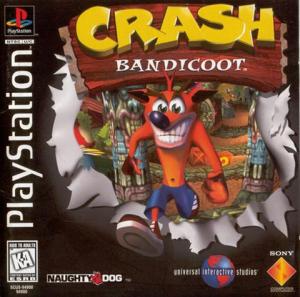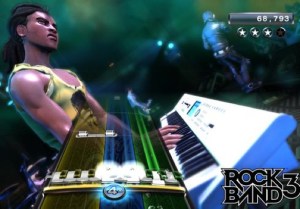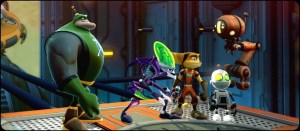Previously: The Playstation and Me: Ted Price, part 1, The Playstation and Me: Ted Price, part 2
To wrap up my interview with games industry vet and all-around nice guy Ted Price, I asked him about his favorite Playstation games as well as ones that deserved more love and how he’s planning to tackle 3D game development. Thanks again to Ted for participating!
So leaving aside your own games, and LBP which you clearly truly love, what’s on your list of top Playstation games?
Oh, man. Are you talking about Playstation exclusives or games I played on Playstation?
Let’s leave exclusives out of it and focus on third-party titles.
OK. Modern Warfare 1 is one of my favorites of all time just because it was such a well-done game in all respects. Very polished, great story, great controls, great gameplay. Uncharted 2, was also one of my top favorites because it was an action movie. You’re basically playing an action movie, which was something that I hadn’t experienced before in any console. They just nailed it. Some others? Let me think about other ones that I’ve been playing. I’ll go back to Rock Band. Rock Band–even though, in some ways, it’s a platform-agnostic game–to me it broke a lot of new ground in terms of social play. And even though Guitar Hero had preceded it, the same guys who made Guitar Hero made Rock Band. They took that formula and they made it work well. And also it’s a game I play incessantly with my kids, which I love. And it’s basically introduced my kids to the kind of music I listen to which is a wonderful side effect.
Yeah. Rock Band is great for music discovery. I’ve just learned about so much stuff that I would have never known otherwise just by virtue of playing it with a bunch of friends.
Yeah, exactly. Let’s see other ones? I’m trying to think of ones that I’ve played lately that are more….
Let me redirect you just for a little bit and ask you what games in the PS1 and PS2 eras were coming out the same time as your Spyros and Ratchet & Clanks, that you made you say, “Oh, man, they did something that we really didn’t achieve.” Titles that made you kind of want to strive to push the envelope of your development even further?
 It’s funny. We’ve always had this kind of back-and-forth relationship with Naughty Dog, where, in some ways, we’ve been direct competitors but we’ve also been very good friends. I’ll say that Crash Bandicoot on the Playstation 1, it came out before Spyro, and we were very inspired by their graphics. I mean they were pushing the Playstation 1 really hard. And the style that they created for that game was unique. I mean, I loved it. We all loved it. Also loved the gameplay. And I’ll also say on the Playstation 1 era, I say Gran Turismo was one of those game that for me as a non-racing game fanatic, sucked me in. Normally I would never get sucked in by racing games. The way that their progression worked, and the realism of their cars, and especially their graphics, were so compelling, that I couldn’t help but play it.
It’s funny. We’ve always had this kind of back-and-forth relationship with Naughty Dog, where, in some ways, we’ve been direct competitors but we’ve also been very good friends. I’ll say that Crash Bandicoot on the Playstation 1, it came out before Spyro, and we were very inspired by their graphics. I mean they were pushing the Playstation 1 really hard. And the style that they created for that game was unique. I mean, I loved it. We all loved it. Also loved the gameplay. And I’ll also say on the Playstation 1 era, I say Gran Turismo was one of those game that for me as a non-racing game fanatic, sucked me in. Normally I would never get sucked in by racing games. The way that their progression worked, and the realism of their cars, and especially their graphics, were so compelling, that I couldn’t help but play it.
On Playstation 2…it’s hard to remember all this stuff. Once again, Naughty Dog, we went back and forth with them. They were doing Jak [& Daxter]. We were doing Ratchet [& Clank]. But I remember we were both pushing the Playstation 2 very hard, and kind f looking to each other for inspiration. So we got a lot of inspiration graphically from what they were doing with Jak. Also, Playstation 2….
What Playstation titles do you think were under appreciated maybe?
 Disruptor on the Playstation 1. Very under-appreciated. [Laughter] Katamari Damacy was probably one of those games on Playstation 2 that was extremely under-appreciated. I thought the controls left a little bit to be desired but the gameplay itself was unique. Nobody had anything like that. I’ll say another one, Ico. It’s one of those fan-favorite cult classics now. While it didn’t do well fiscally, I think many of us in the development community still look to that game as a perfect example of establishing mood. They employed some subtle tricks to make you feel as if you really were in the world and we analyzed it heavily as we were developing our games at the time.
Disruptor on the Playstation 1. Very under-appreciated. [Laughter] Katamari Damacy was probably one of those games on Playstation 2 that was extremely under-appreciated. I thought the controls left a little bit to be desired but the gameplay itself was unique. Nobody had anything like that. I’ll say another one, Ico. It’s one of those fan-favorite cult classics now. While it didn’t do well fiscally, I think many of us in the development community still look to that game as a perfect example of establishing mood. They employed some subtle tricks to make you feel as if you really were in the world and we analyzed it heavily as we were developing our games at the time.
You guys are entering into a new chapter of Insomniac wherein you’re going to be developing stuff not exclusively for Playstation anymore. I know you released a video and spoke a little about how that came about. But now that you’re probably a little bit further away from the initial announcement, how does it feel that part of your fate is going to be in some other platform holder’s hands?
Well, that’s true but we’re releasing on two platforms that are already mature. It isn’t as if either the Xbox 360 or the PS3 is suddenly going to vanish. So there’s a large core audience for both now. Or a large established audience for both. So I don’t feel any kind of trepidation about releasing a game on both the Xbox 360 and the PS3. What I think was cool is that we are continuing to work very closely with the same folks at Sony. And it’s been wonderful that in this business where an announcement of a traditionally first-party developer going multi-platform can create problems, it didn’t in this case. Sony understood our reasons for going multi-platform and we were interested in continuing to work together just because it’s a relationship that’s made sense for so long and things continue to be good.
What are you looking forward to in terms the life cycle for Playstation 3 and Playstation as a brand? What do you want them to do? What would you like to see other developers push them towards?
There are certainly a couple of opportunities. There’s 3D and there’s Move on the Playstation 3 that, if used right, can change the way people play games. For example, I played Sports Champions when I was in Europe at GamesCon, and it felt as if I was actually pulling arrows out of my quiver, nocking them on my bow, and then pulling the string back. I never experienced anything that in a game before.
To me, it was a great demonstration of how Move can be used correctly to bring about new gameplay experiences. I think the danger, of course, is if something like Move becomes tacked on to a game, and people just throw it in because it’s going to be a bullet point on the back of the box. But, if developers use it as the core controller, I think it really can enhance the player’s experiences. Same with 3D. When I was playing MotorStorm Apocalypse at E3, playing a demo in 3D, and it was amazing.
I wasn’t expecting the kind of immersion that I got from that demo. But these guys have studied how to use 3D and how it can enhance the gameplay experience and not hurt it. They’re setting a great example for the rest of the developers out there in terms of how to use 3D. I’ll give you another example from mainstream. I think that 3D will succeed as long as developers take the Avatar approach versus Clash of the Titans approach. James Cameron says that 3D was a very important part during production of Avatar. Everything was thought of in 3D. Whereas, if you watch Clash of the Titans, it was added on as an afterthought. And the difference is measurable.
I think the same applies to games. If you are thinking about how to use 3D to enhance the game player’s experience, you’re going to get something that’s much better than 2D. However, if you are just trying to throw it in at the last minute, it may not be as compelling as it could be.
Is it fair to assume that the next IP coming from you guys is going to have 3D in mind?
It depends. It just depends on whether or not we believe it’s going to make the game experience better.
Right. So, you’re saying it’s not a given. But, are you too far underway to get to that point? It seems like you would have had to make that decision early on.
Well there’s actually a difference, perhaps. There’s a difference between how people do it in movies and how we can do it in games. With games, I believe making 3D work effectively is a matter of just thinking the process through and making sure that you’re using 3D in the appropriate places. As opposed to, say, using it in movies where you have to film everything with two cameras.
Yeah.
In movies you have to plan ahead of time. Where, from the very first day of production, you’ve got stereoscopic cameras out there filming. Games, it’s a different paradigm all together, because we’re using virtual cameras, and we don’t have to worry as much about what they’ve worried about.
Everybody cites Avatar in terms that you got to shoot natively with stereoscopic equipment or else the algorithm on the back-end just doesn’t provide the same results.
Yeah. And in games, at whatever point you implement 3D, you just can’t slap it on. You’ve got to be thinking about how it effects, say, the combat scenarios and be careful not to make it annoying. Make sure that it enhances the gameplay experience. I’m not saying that this is a labor-intensive process, because it isn’t. I think Sony’s made it very clear that you can implement 3D pretty quickly. It’s just that you have to think about it to make sure that you’re doing it right.



